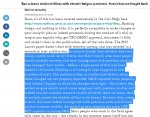Simon wessely
SEPTEMBER 23, 2016 AT 7:13 AM
Dave, all of this has been covered extensively in the trial FAQs here
http://www.wolfson.qmul.ac.uk/current-projects/pace-trial/#faq. Nothing dodgy and nothing to hide. It is perfectly acceptable to make changes to your analytic plan or indeed protocols during the conduct of a trial so long as you explain why, get TSC/DMEC approval, document it fully and make it clear in the publication. All of that was done. The 2012 Lancet paper doesn’t deal with recovery anyway, that was covered in a secondary later publication. I
n essence though they decided they were using a overly harsh set of criteria that didn’t match what most people would consider recovery and were incongruent with previous work so they changed their minds – before a single piece of data had been looked at of course.
Nothing at all wrong in that- happens in vast numbers of trials. The problem arises, as studies have shown, when these changed are not properly reported.
PACE reported them properly. And indeed I happen to think the changes were right – the criteria they settled on gave results much more congruent with previous studies and indeed routine outcome measure studies of which there are many.
And re analysis proves the wisdom of that to be honest. But even then, using criteria that were indeed incongruent with previous work and clinical routine outcome studies, the overall pattern remains the same. CBT GET superior to pacing SMC. Most people who work in the field agree with them by the way – the criteria in the recovery paper itself (not the main lancet paper which never dealt with ) approximate with all the previous work – reasonable and meaningful but not the new penicillin.
Am not going to respond to more comments on the same lines except to say it’s very likely that this has been addressed before and covered in previous responses by the authors and the trial FAQs. If you want to use the original recovery criteria you can, but I think that the ones that the trialists finally decided upon are more realistic to patients and clinicians alike . And finally it’s not a surprise that if you use extremely harsh criteria you get lower frequencies- no one has pointed out that the original criteria did indeed give recovery rates for Pacing and SMC that are also pretty daft and don’t match patient experience of either. People do get better on pacing and even just TLC- it’s just that more get better with GET and CBT, but still not enough. OK, enough already. Back to day job.

